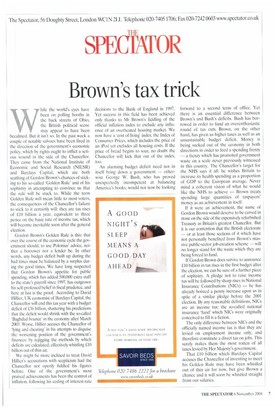Brown's tax trick
Nvhile the world's eyes have been on polling booths in the back streets of Ohio, the British political scene may appear to have been becalmed. But it isn't so. In the past week a couple of notable salvoes have been fired in the direction of the government's economic policy, which by rights ought to inflict a serious wound in the side of the Chancellor. They came from the National Institute of Economic and Social Research (NIESR) and Barclays Capital, which are both scathing of Gordon Brown's chances of sticking to his so-called 'Golden Rule' and of his sophistry in attempting to convince us that the rule will be stuck to. While the term Golden Rule will mean little to most voters, the consequences of the Chancellor's failure to stick to it certainly will: they are tax rises of £10 billion a year, equivalent to three pence on the basic rate of income tax, which will become inevitable soon after the general election.
Gordon Brown's Golden Rule is this: that over the course of the economic cycle the government should, to use Polonius' advice, neither a borrower nor a lender be. In other words, any budget deficit built up during the had times must be balanced by a surplus during the good times. We have long suspected that Gordon Brown's appetite for public spending, which has added 500,000 extra staff to the state's payroll since 1997, has outgrown his self-professed belief in fiscal prudence, and here at last is the proof. According to David Hillier, UK economist of Barclays Capital, the Chancellor will end this tax year with a budget deficit of £36 billion, shattering his predictions that the deficit would shrink with the so-called 'Baghdad bounce' in the economy after March 2003. Worse, Hillier accuses the Chancellor of 'lying and cheating' in his attempts to disguise the worsening position of the government's finances: by rejigging the methods by which deficits are calculated, effectively whistling .£10 billion out of thin air.
We might be more inclined to treat David Hillier's accusations with scepticism had the Chancellor not openly fiddled his figures before. One of the government's most praised achievements has been the control of inflation, following his ceding of interest rate decisions to the Bank of England in 1997. Yet success in this field has been achieved only thanks to Mr Brown's fiddling of the official inflation index to exclude any influence of an overheated housing market. We now have a 'cost of living' index, the Index of Consumer Prices, which includes the price of an iPod yet excludes all housing costs. If the price of bread begins to soar, no doubt the Chancellor will kick that out of the index, too.
An alarming budget deficit need not in itself bring down a government — otherwise George W. Bush, who has proved unexpectedly incompetent at balancing America's books, would not now be looking forward to a second term of office. Yet there is an essential difference between Brown's and Bush's deficits. Bush has borrowed in order to fund an overenthusiastic round of tax cuts. Brown, on the other hand, has given us higher taxes as well as an unsustainable budget deficit. Money is being sucked out of the economy in both directions in order to feed a spending frenzy —a frenzy which has promoted government waste on a scale never previously witnessed in this country. The Chancellor's target for the NHS says it all: he wishes Britain to increase its health spending as a proportion of GDP to the European average. Never mind a coherent vision of what he would like the NHS to achieve — Brown treats spending large quantities of taxpayers' money as an achievement in itself.
If it were an achievement, the name of Gordon Brown would deserve to be carved in stone on the side of the expensively refurbished Treasury as Britain's greatest Chancellor. But it is our contention that the British electorate — or at least those sections of it which have not personally benefited from Brown's mas sive public-sector job-creation scheme will no longer stand for the waste which they are being forced to fund.
If Gordon Brown does survive to announce £10 billion in tax rises in the first budget after the election, we can be sure of a further piece of sophistry. A pledge not to raise income tax will be followed by sharp rises in National Insurance Contributions (NICs) — he has already hoisted a penny increase upon us in spite of a similar pledge before the 2001 election, By any reasonable definitions, NICs are an income tax: the so-called national insurance 'fund' which NICs were originally conceived to fill is a fiction.
The only difference between NICs and the officially named income tax is that they are levied on employment income only, and therefore constitute a direct tax on jobs. This surely makes them the most rotten of all taxes levied by Her Majesty's government.
That £10 billion which Barclays Capital accuses the Chancellor of inventing to meet his Golden Rule may have been whistled out of thin air for now, but give Brown a chance and it will soon be whistled straight from our salaries.


























































































































 Previous page
Previous page